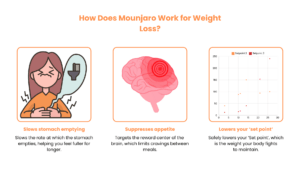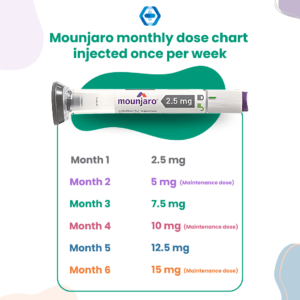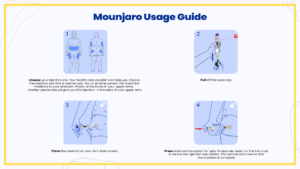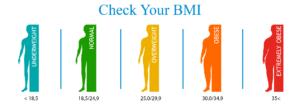If you’re struggling with obesity, you must have heard numerous pieces of advice about eating clean, doing a calorie-deficit diet, going to the gym, etc. But nothing is really working because you are unable to control your food cravings.
The issue is that outdated counsel won’t make a difference unless a suitable drug is combined with certain lifestyle modifications. Since obesity is a chronic illness rather than a lifestyle issue. It can result in a number of grave health problems, such as strokes, heart disease, type 2 diabetes, and specific cancers.
While struggling with obesity and finding suitable solutions, you must have considered using Mounjaro – a new weight loss injection that’s been generating a buzz. In this article, we’ll answer the top 10 frequently asked questions about Mounjaro, with insights from healthcare experts.
1. What is Mounjaro, and how does it work for weight loss?
Mounjaro is an injectable medication approved by MHRA for weight loss. It contains a compound that targets the metabolic pathways associated with fat storage and energy consumption. By regulating appetite and enhancing the body’s ability to burn fat, Mounjaro aids in significant weight reduction.

The active ingredient Tirzepatide in Mounjaro works by mimicking the action of 2 natural hormones- GLP-1 and GIP, that control hunger and satiety. When you inject Mounjaro, it suppresses your appetite, making it easier to adhere to a reduced-calorie diet. Additionally, it promotes the breakdown of stored fat, contributing to overall weight loss.
2. Is Mounjaro Available in the UK?
Yes, Mounjaro is available in the UK. It can be obtained through licensed healthcare providers and clinics specialising in weight management. Patients interested in Mounjaro should consult with their healthcare provider to determine whether it is suitable for their weight loss journey.
3. How long do Mounjaro side effects last?
Like any medication, Mounjaro also has side effects. Common side effects include nausea, headache, and dizziness. These side effects are typically mild and temporary, often resolving within a few days to a week as the body adjusts to the medication.
However, the serious side effects may last longer and need long term treatment. According to studies, some severe side effects of Mounjaro include pancreatitis and hypoglycemia or low blood sugar which may require immediate medical attention.
4. Can you switch from Ozempic to Mounjaro?
Yes, you can switch from Ozempic to Mounjaro if you want to lose weight fast. But remember, you can not use these medications simultaneously. You should seek help from your healthcare provider before making the switch.
Ozempic is not a weight loss medicine, and it has been used off-label for weight loss. However, Mounjaro is licensed for chronic weight management.
Ozempic is a GLP-1 receptor agonist, while Mounjaro, also known as Tirzepatide, acts as a dual GIP and GLP-1 receptor agonist. Your healthcare provider will assess your medical history, current health status, and weight loss goals to determine if switching to Mounjaro is your best option.
5. Do you need a prescription for Mounjaro?
Yes, Mounjaro requires a prescription. Like many weight loss medications, Mounjaro must be prescribed by a licensed healthcare provider. This ensures that the medication is appropriate for your specific health needs and that you are monitored for any potential side effects or complications.
Always follow the prescriber’s guidance when using prescription medications.
6. What are the dosages and how should they be followed?
Mounjaro dosages vary depending on individual health conditions and weight loss needs. Typically, it is administered as a subcutaneous injection once a week.
You should start Mounjaro with its minimum dosage of 2.5mg for at least a month. The dosage should gradually increase based on your body’s response and tolerance.
There are 6 Mounjaro doses available in the UK:
– 2.5 mg
– 5 mg
– 7.5 mg
– 10 mg
– 12.5 mg
– 15 mg
Mounjaro Dosage Chart

Why should you gradually increase the dosage?
Mounjaro has a specific dosing schedule to help your body gradually get used to the new medication. If you increase the dose too quickly or start at a higher dose, you might have a higher risk of side effects or severe illness.
Doctors have studied Mounjaro, and the dosing schedule is designed to be the safest and most effective way to take it. Other weight loss injections, like Wegovy and Saxenda, also have their own dosing schedules.
7. How to use the Mounjaro KiwikPen?
You can inject Mounjaro into your thighs or abdomen. You can also inject it into your upper arms, but you’ll need someone to help you with that. Change your injection site every week to avoid soreness and irritation. For more details on how to inject Mounjaro, refer to the image below.

8. Who is eligible for Mounjaro injections?
Eligibility for Mounjaro injections is determined by various factors, including BMI, medical history, and weight loss needs. Individuals with a BMI of 30 or higher or those with a BMI of 27 or higher with at least one weight-related condition, such as high blood pressure, heart disease, or obstructive sleep apnea, are eligible for Mounjaro.

Nonetheless, your healthcare provider will thoroughly assess whether Mounjaro is a suitable option for you.
9. How quickly will I see results with Mounjaro?
Mounjaro starts working as soon as you take it, but it takes at least 4 weeks to see significant results. According to clinical trials, you can lose up to 22% of your body weight with Mounjaro after 72 weeks.
In clinical trials, it has been observed that the most effective Mounjaro dosage for weight loss is 15 mg.
After 72 weeks of treatment, patients lost an average of:
> 22.5% of their starting weight with the 15 mg maximum maintenance dose
> 21.4% of their starting weight with the 10 mg maintenance dose
> 16% of their starting weight with the 5 mg maintenance dose
Factors influencing the effectiveness of Mounjaro include adherence to the dosage regimen, diet, physical activity levels, and individual metabolic response. Regular follow-ups with your healthcare provider will help track progress and make necessary adjustments.
10. Can Mounjaro be used in combination with other weight loss medications?
Mounjaro cannot be combined with other weight loss medications such as Wegovy or Saxenda. The interaction between different medicines can lead to severe side effects such as nausea, vomiting, and diarrhoea.
Buy Mounjaro Online Today!
Ready to start your weight loss journey? Discover our range of weight management treatments and fill out a quick consultation form today.
Our expert prescribers will assess your answers to find the best medication for you. Once you’re done with the consultation, we’ll discreetly deliver your medicine straight to your door.
It’s that simple!
